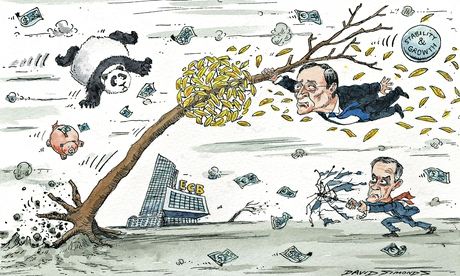Central bankers appear on stage like army generals these days. They boast about their firepower and claim they will crush inflation, their longtime adversary. No quarter will be given in the war. The collateral damage will be high.
A week on Thursday, the Bank of England will raise interest rates for a seventh time since last December, probably to 2.25%, and semaphore the message to financial markets that Threadneedle Street is not finished in its quest to defeat inflation.
The conclusion must be that more rate rises are on the way, possibly to 3.5% or even 4% from today’s 1.75%, pushing average mortgage rates to more than 6%.
Once the consumer prices index had jumped to 10.1% in July, there was no doubt in the minds of most City analysts that the Bank would increase the cost of borrowing at its next meeting, and continue raising it into next year.
Meanwhile, the European Central Bank boss, Christine Lagarde, said on Thursday that “determined action had to be taken”, following an unprecedented 0.75 basis points increase in the eurozone interest rate, to 1.25%.
Jerome Powell, the US Federal Reserve chief, may as well have worn army fatigues in his most recent appearances, such is his newfound swagger. He told a meeting of central bankers in Jackson Hole, Wyoming, last month that the Fed would use its tools “forcefully” until prices were under control.
Last week he was on the warpath again, saying he would act “forthrightly, strongly”, before adding: “We must keep at it until the job is done.”
Powell and Lagarde stand with the governor of the Bank of England, Andrew Bailey, in making a case for action based on the premise that higher interest rates can suppress inflation currently in the system, spurred mainly by higher energy prices and a spillover into higher transport and food prices.
Burdensome borrowing costs will also counter so-called second-round effects that flow from workers demanding high wage rises to compensate for the negative impact of inflation on living standards.
These arguments are undermined by a lack of supporting evidence, prompting the conclusion that central bankers have been pushed into macho posturing by politicians who want banks to get a grip while they sit on their hands, and by conventions in economic thinking.
Economic theory says high inflation encourages consumers to increase spending rather than risk hanging on to cash that will be worth less in a year’s time. Higher borrowing costs tame this impulse.
But more recent studies show that shoppers know high inflation is a fairly good signal of a troubled economy and their response is to stop spending and increase saving. They might want a new job and a pay rise, but fears of a recession lead them to stick with the job they have and swallow the pay rise on offer.
The latest S&P Global survey of the UK jobs market found that pay growth in August had fallen to its lowest level since March. Why March? Because that was when workers were confident the pandemic was over and things were looking up.
It gets worse for central banks when we take a closer look at the nature of inflation, which is mostly imported. Most of the affected imports are essential items such as energy and food. People and firms must buy energy and food, so monetary policy has little effect on the volume purchased.
Shortages of goods are another factor driving up prices in the shops, but if that problem can be traced back to Covid-19 lockdowns in Chinese factories, then interest rises in the UK will again have no effect.
Catherine Mann, the former chief economist at the US investment bank Citigroup, gives another reason to increase rates sharply. She says that so long as the Fed and ECB are hiking, so must Britain’s central bank, or sterling will slump towards parity with the dollar.
Her point is that in a competitive world, funds flow to where interest rates are highest, and that is the US, where the base rate is already in a band between 2.25% and 2.5%. She says a falling pound invites further inflationary pressure, given how much Britain relies on imports. So unless the MPC acts tough, it will get left behind and so will the pound.
Yet this stance just goes to emphasise that all central banks have lost the plot – raising rates based on scant evidence that it will have the required effect. Low interest rates encourage reckless speculation; in an ideal world rates would be high enough to make financial institutions think twice before gambling, mostly on property.
In a crisis, however, low rates are a saviour, especially when so many people and businesses have been encouraged to burden themselves with high levels of debt.
So before they give themselves a medal, central bankers should acknowledge that the means to bring down inflation are in the hands of others.











